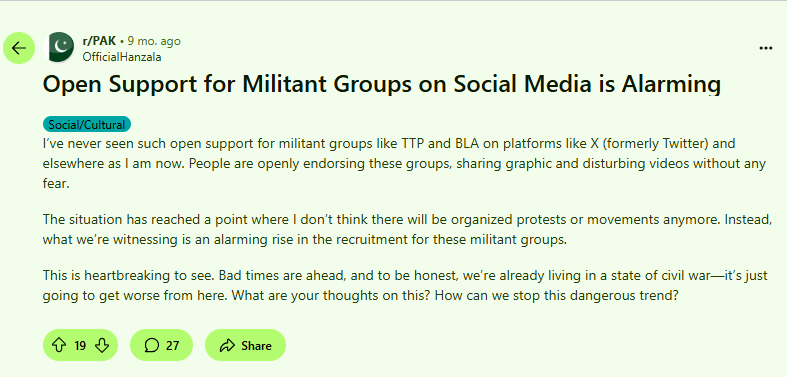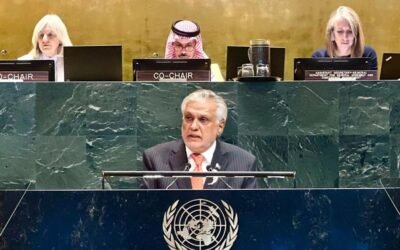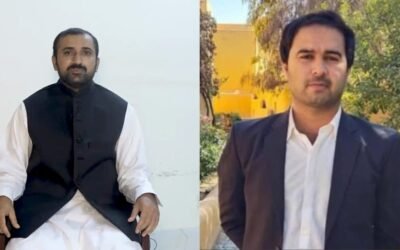In recent years, Pakistani Islamic scholars—working in tandem with state institutions—have embarked on a theological and ideological campaign to delegitimise extremist groups such as the Fitna al Khawarij (FAK) formerly TTP and the Islamic State Khorasan Province (ISKP) by invoking the historical term “Khawarij.” This label, echoing the early Islamic sect notorious for declaring mainstream Muslims apostates, is being repurposed to expose and undermine modern jihadist narratives. Yet the effectiveness of this framing varies across urban and rural domains, and the initiative is constrained by challenges of credibility, dissemination, and political acceptance.

Historical, and Theological Framing
The term Khawarij (or Kharijites) refers to a sect that emerged in the 7th century following the Battle of Siffin, rebelling against the fourth Caliph, Hazrat Ali (RA). The Khawarij were notorious for takfir—excommunicating fellow Muslims—and justifying violence against them. They murdered Muslims who disagreed with them, including revered figures of early Islam, under the pretext of piety.
Modern extremist groups mirror this approach. They employ takfirist logic, branding the majority of Muslims and the Pakistani state as illegitimate, and sanctioning violence as a divine duty. By drawing this parallel, today’s scholars frame TTP and ISKP as religious outcasts rather than holy warriors, effectively robbing them of theological legitimacy
You May Like To Read: The Kulbhushan Jadhav Echo: Enduring Relevance of Espionage Cases in Indian Proxy Warfare
State–Scholar Alliances, and Initiatives
Recognising the power of religious language, Pakistan’s National Counter-Terrorism Authority (NACTA) and the Ministry of Interior in 2024 directed officials and media to stop using honorific titles like mujahid for FAK and instead apply the prefix Khawarij. This formal rebranding was meant to reduce their appeal among religiously inclined audiences..
Alongside this state narrative, the Paigham-e-Pakistan fatwa—endorsed by 1,800 scholars from various schools of thought—declared terrorism, suicide bombings, and killing innocents as haram (forbidden). This broad scholarly consensus attempted to present a united clerical front against militancy.

Impact, and Reach Across Different Audiences
This framing has produced measurable shifts in urban and semi-urban Pakistan. Mainstream Muslims increasingly reject extremist arguments, viewing militant outfits as destructive deviants rather than defenders of Islam. Sermons, televised debates, and fatwa endorsements have reinforced the idea that groups like FAK and ISKP are religious renegades.
However, the effectiveness diminishes in tribal and militancy-influenced areas, where clerics associated with the state lack credibility. Here, decades of conflict and perceptions of state injustice undermine the authority of official scholars.
The Qur’an (4:59) commands obedience to Allah, His Messenger, and those in authority. Paigham-e-Pakistan affirms that revolt against an Islamic state is haram and falls under hirabah. A fatwa that tells soldiers to fight their own state is not religion it’s treason masked as… pic.twitter.com/7Do4HYMVXx
— Fizza Urooj (@Fizz_Urooj) August 18, 2025
Strengths, and Weaknesses of the Narrative
Strengths:
- Theological clarity: By linking extremists to a historically reviled sect, scholars tap into a powerful cultural taboo.
- Unified front: Diverse religious schools rarely agree, but on this issue their consensus enhances legitimacy.
- Institutional backing: State amplification ensures wide media reach and official endorsement.
Weaknesses:
- Credibility gap: In regions with deep distrust of Islamabad, state-aligned clerics are dismissed as politicised.
- Over-instrumentalisation: Critics argue the state uses religion as a political tool, diluting scholarly sincerity.
- Narrow framing: Restricting discourse to “haram vs. halal” overlooks the socio-economic grievances that extremists exploit.
Public Reactions, and Online Discourse
The campaign has generated mixed responses. On platforms like Reddit and X, some users endorse the theological denunciation of militants. Others worry the Khawarij label could be abused to silence legitimate dissent. Simultaneously, reports of open militant sympathies on social media highlight the urgency of counter-messaging:
These divided perceptions illustrate both the promise and fragility of the state-scholar narrative.
Comparative Perspective
Other Muslim-majority states have also mobilised theology to combat extremism. Egypt’s Al-Azhar University routinely issues fatwas denouncing IS and Al-Qaeda, branding them theological deviants. Saudi Arabia has criminalised the ideological legacy of the Khawarij, framing extremist violence as rebellion against legitimate authority. Pakistan’s campaign is thus part of a broader global pattern where states leverage Islamic scholarship to curb militant legitimacy. Yet Pakistan’s challenge is more acute, given the proximity of conflict zones and the enduring networks of FAK and ISKP.
You May Like To Read: Pakistan Air Force Launches Major Flood Relief Operation in Gilgit-Baltistan
Policy Implications and Future Outlook
For Pakistan, countering violent extremism requires more than theological branding. Future efforts must:
- Localise delivery: Empower clerics with genuine community standing in conflict-affected regions.
- Integrate civic narratives: Highlight Islam’s compatibility with democracy, rights, and governance, not just prohibitions.
- Engage youth: Use digital platforms, schools, and madrassas to inoculate young minds against extremist propaganda.
- Pair narrative with justice: Ensure counter-terrorism campaigns address legitimate grievances, so extremists cannot monopolise victimhood narratives.
By labelling FAK and ISKP as Khawarij, Pakistan’s scholars and state institutions have attempted to reclaim the religious discourse hijacked by extremists. This initiative reflects conceptual strength, particularly in urban centers where theological clarity resonates. However, its uneven impact in peripheral regions underscores the importance of credibility, inclusivity, and socio-political context. For the narrative to succeed, it must evolve from reactive fatwas into a sustained intellectual, educational, and governance-linked movement—one that convincingly demonstrates that Islam, far from sanctioning militancy, provides the moral foundation for peace, justice, and order in Pakistan.




























